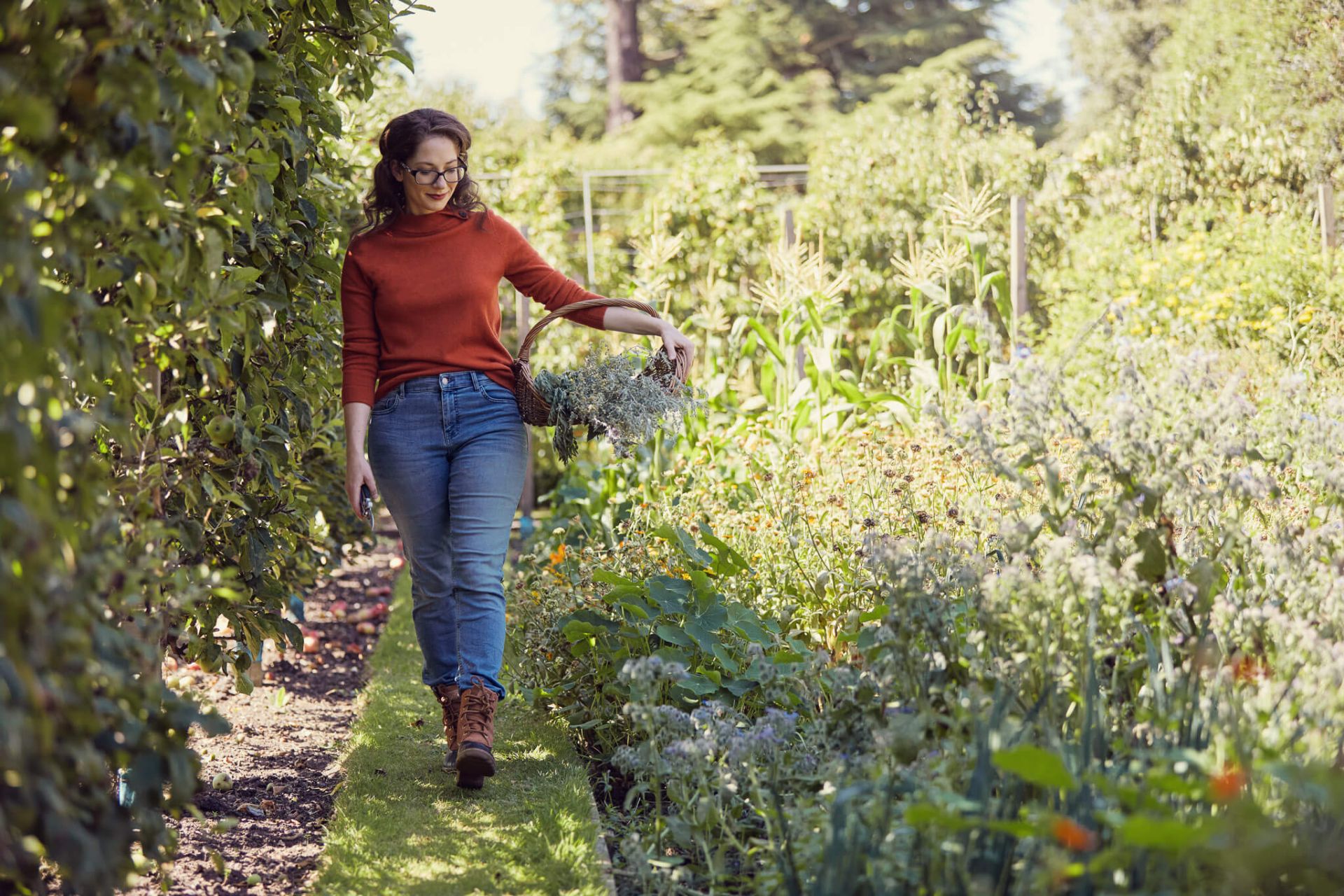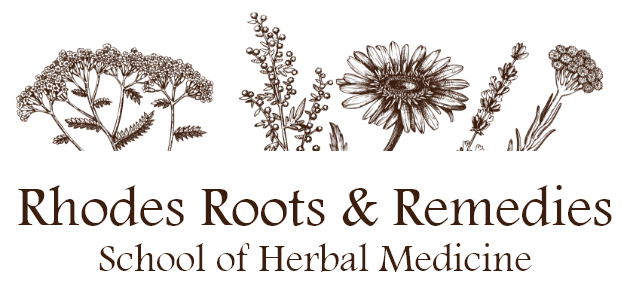Has exploring different modalities of natural and holistic health left you wondering - What is a herbalist? A herbalist is a person who works with whole plants to make remedies that support health, wellbeing and the delicate state of balance within the body. Not only do herbalists cultivate deep knowledge of the medicinal properties and benefits of plants, but we also have an acute understanding of how the human body works physically, emotionally and energetically. There are many different ways to become a herbalist, but first, it’s helpful to understand two different types of herbalists.

1. What is a herbalist? The home herbalist
When I get asked the question, what is a herbalist?, I often think about home herbalists. A home herbalist or family herbalist is someone who has developed their knowledge of herbal medicine with the primary intention of supporting their own family’s health naturally with herbs. Some consider it part of working towards self-sufficiency, others see it as a way to build their family’s resilience, others value the ancient tradition of working with herbs in the home. Many people choose to become home herbalists because they want to unplug from the chemical-based allopathic medical system and only rely on it for true emergencies.
Home herbalists are often self-taught, building their knowledge over the years from books and a patchwork of short online herbalism courses or in-person herbal medicine workshops. A home herbalist does not require a formal qualification or insurance, as they are providing support within their immediate family.
Where do home herbalists tend to get stuck on their journeys?
They’ll often amass lots of books or watch lots of short online herbalism courses, but struggle to bring herbalism into their daily lives. They may have lingering questions about herbs, remedies and health that really need real person-to-person interaction. They may be confused by written instructions or unsure where to source ingredients and materials. They may just be overwhelmed with the sheer number of fact sheets and digital recipe cards they’ve collected and can’t decide where to start.
2. What is a herbalist? The clinical herbalist
The other main way I answer the question, what is a herbalist?, is to describe a clinical herbalist. A clinical herbalist - also known as a medical herbalist or clinical herbal medicine practitioner - is most often someone who has completed a multi-year accredited course and earned a qualification. A clinical herbalist will often be a member of a professional body such as the College of Practitioners of Phytotherapy (CPP) or the National Institute of Medical Herbalists (NIMH) in the UK and have insurance. Clinical herbalists undergo rigorous training that includes 500 clinic hours supporting patients under supervision of qualified herbalists, as well as numerous hours of study of medicinal plants, the human body - both from a modern scientific perspective, as well as from a more nuanced energetic and holistic perspective. Clinical herbalists learn skills such as physical examination, taking blood pressure and pulse, tongue diagnosis and a range of other practical assessment skills. They are able to diagnose, perform diagnostic tests and refer patients to GPs for further referrals when necessary.
There are few remaining university degree courses in clinical herbalism in the UK. Most qualification courses are now run through specialist schools who have received accreditation. There are also reputable clinical herbalists who have trained through traditional apprenticeships with knowledgeable teachers over many years, so it depends on your path and preference which route you choose.
A clinical herbalist will primarily support clients on a 1:1 basis, creating bespoke herbal remedies. They may work in a holistic clinic or remotely from their own offices.
Where do clinical herbalists tend to get stuck on their journeys?
There is a lot of factual information to cover on a qualification course to fulfil its requirements, which is necessary, but does not always provide as much hands-on experience with the plants and remedy making as a student would like. Some trainee clinical herbalists want to deepen their connection with the plants directly, as well as dive deeper into energetic systems (e.g. Ayurveda, Traditional Chinese Medicine, Western Galenics) than there is time for on a qualification course.
3. What is a herbalist? Isn’t there a middle ground?
Now that you can answer the question - What is a herbalist? - you may now be wondering if there’s a middle ground between self-taught patching things together on your own at home and a full-blown clinical qualification, especially if you don’t want to be a clinical practitioner, but you do want to be confident you know what you’re doing so you can support family and friends safely and effectively.
The answer is yes! This is exactly what we do on our intensive herbalism course - Awaken Herbal Wisdom. We go deep into building your knowledge and skills so you can truly make herbal medicine part of your daily life and your go-to when supporting family and friends. On the course, students:
- Develop an intimate knowledge of a select group of medicinal herbs able to be grown or foraged in the UK
- Cultivate the skill of medicine-making with their own hands to begin to establish a resilient home apothecary
- Peel back the layers of human health and energetics, enabling them to be able to understand how the body works, decipher, then address the messages our bodies express, without memorising extensive lists of medical terminology
- Attune to the constitutions of people and the qualities of medicinal plants to craft effective and safe herbal treatments
- Root deeply into their confidence in taking ownership of their health
- Become part of a tapestry of like-minded, curious and empowered souls
- Bring and spread joy in cultivating deep health for themselves, their loved ones and their community.
So if you’ve been wondering - what is a herbalist? - now you are familiar with two main types: the home herbalist and the clinical herbalist. You know the ways their journeys commonly unfold, as well as where they tend to get stuck. You’ve also found there can be a middle ground - a way to become thoroughly competent and confident without going through a full-blown clinical qualification.
And if you’re here in the UK, you’re very welcome to take the next step on your journey learning herbal medicine with us on our intensive herbalism course - Awaken Herbal Wisdom - which spans all four seasons and gets herbalism both deep into your bones and your daily life. This is the course that will give you that solid context and confidence to practise herbalism safely and effectively with your family and friends without having to do a full-blown clinical qualification. You can learn more about our herbal medicine course here. Be sure to put your name on the waiting list to see what the current cohorts are up to and get first access to enrolment before it opens.
Whatever type of herbalist you choose to become, I hope you enjoy the journey!
At Rhodes Roots & Remedies School of Herbal Medicine, our practice of herbalism is rooted in the belief that we must remember, reclaim and relearn our knowledge of our bodies, our autonomy and how to work with plant medicine in order to bring control of our own health back into our families and homes for a sustainable future for ourselves and the planet. Through our intensive herbalism course, we facilitate the development of confident, empowered herbalists, attuned to the messages of their bodies and the natural world. Living the deep wisdom of herbal medicine within themselves, their homes and their communities, they uplift themselves and others, creating a stronger society organically. We do hope you'll join us on your journey!

